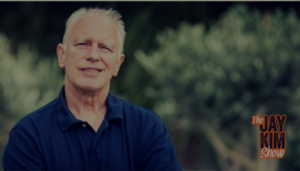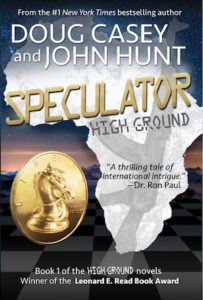Blog
The Politically Correct Definition of Racism Is Racist
Published on Casey’s Daily Dispatch, the following article was written by John Hunt and is a thought-provoking look at the term ‘racism.’ He explains the significant difference between the collectivist and individualist definitions of ‘racism’ and offers a solution to the issue of racism.
‘As the War Machine Threatens’ with Comments from John Hunt
Read As the War Machine Threatens, published on Free-Man’s Perspective. John Hunt comments,
“In Syria it is a battle between bullies. Wouldn’t it be nice if they just beat each other to a pulp while we, instead of sticking our nose in, lived our free lives? But there is danger that we in the US might further enter the fray and poke the Russian dragon in the process, possibly based on a false flag operation. May sane minds prevail. Too bad there are so many sociopaths in positions of power.”
Larry Correia on Gun Control
Doug Casey notes that this is a “generally excellent article, indeed,” while John Hunt describes the article as, “A thorough and rational discussion that will remind gun owners of their moral high ground. And will cause gun banners to become defensive and hurl insults and generally decay into infancy as they try to protect their egos from exposure to truth.” Check it out!
What to do if the Economy Collapses: Robert & Kim Kiyosaki Interview Doug Casey
 In an interview with Robert and Kim Kiyosaki, Doug Casey shares his views on what you can do to protect your wealth and even make money in an uncertain economy. Listen to the pod cast here.
In an interview with Robert and Kim Kiyosaki, Doug Casey shares his views on what you can do to protect your wealth and even make money in an uncertain economy. Listen to the pod cast here.
Head of Blockchain for JPMorgan Leaving to Start a Business
John Hunt says, “Perhaps this is the beginning of a banking brain-drain. Despite the banking sector’s allure as the greatest beneficiary of central banking cronyism, the free market of crypto and blockchain siphons bright people away from them. I hope this continues and accelerates.”
A Look at Health ‘Insurance’: Peter McCandless Interviews John Hunt
 John Hunt speaks with Peter McCandless about his views on the current state of health insurance, which he says is really a pre-paid medical care plan and not designed to ‘ensure’ health in any regard. Listen to the pod cast here.
John Hunt speaks with Peter McCandless about his views on the current state of health insurance, which he says is really a pre-paid medical care plan and not designed to ‘ensure’ health in any regard. Listen to the pod cast here.
Drug Lord is a Finalist for 38th Annual Prometheus Award for Best Novel
Doug Casey and John Hunt are among the six finalists selected for the Prometheus Award for Best Novel, for their 2017 novel, Drug Lord. For nearly 40 years, the Prometheus Award has been  presented annually by the Libertarian Futurist Society, recognizing notable works of science fiction and fantasy that examine the meaning of freedom. The first in the High Ground Series novels, Speculator, was among those nominated for last year’s Prometheus Award. This year’s winners will be announced at the World Science Fiction Convention in August.
presented annually by the Libertarian Futurist Society, recognizing notable works of science fiction and fantasy that examine the meaning of freedom. The first in the High Ground Series novels, Speculator, was among those nominated for last year’s Prometheus Award. This year’s winners will be announced at the World Science Fiction Convention in August.
Finalists for the 38th Annual Prometheus Award:
Drug Lord: High Ground by Doug Casey and John Hunt
The Powers of the Earth by Travis Corcoran
Torchship, Torchship Pilot and Torchship Captain by Karl Gallagher
Darkship Revenge by Sarah Hoyt
The Corporation Wars: Emergence by Ken MacLeod
Artemis by Andy Weir
Jay Kim Interviews Doug Casey
 In an interview with Jay Kim, Doug Casey starts at the beginning, describing his career path and how he became interested in investing. Their conversation includes interesting insights on what it takes to be a speculator, Doug’s current picks for investments, his thoughts on cryptocurrencies, and a closer look at the High Ground novel series. Check out the podcast here.
In an interview with Jay Kim, Doug Casey starts at the beginning, describing his career path and how he became interested in investing. Their conversation includes interesting insights on what it takes to be a speculator, Doug’s current picks for investments, his thoughts on cryptocurrencies, and a closer look at the High Ground novel series. Check out the podcast here.
Fergus Hodgson Reviews Speculator
Fergus Hodgson describes Charles Knight as “rugged individualism personified” in his review of Speculator, the first book in the High Ground novel series written by Doug Casey and John Hunt.
Doug Casey’s Top 5 Reasons Not to Vote
[In this classic interview, Doug Casey talks with Louis James, the editor of Casey Research’s International Speculator research service. Doug explains the five reasons why voting isn’t just stupid… it’s evil.]
 Louis James: Doug, we’ve spoken about presidents. We have a presidential election coming up in the U.S. – an election that could have significant consequences on our investments. But given the views you’ve already expressed on the Tea Party movement and anarchy, I’m sure you have different ideas. What do you make of the impending circus, and what should a rational man do?
Louis James: Doug, we’ve spoken about presidents. We have a presidential election coming up in the U.S. – an election that could have significant consequences on our investments. But given the views you’ve already expressed on the Tea Party movement and anarchy, I’m sure you have different ideas. What do you make of the impending circus, and what should a rational man do?
Doug: Well, a rational man, which is to say, an ethical man, would almost certainly not vote in this election, or in any other – at least above a local level, where you personally know most of both your neighbors and the candidates.
L: Why? Might not an ethical person want to vote the bums out?
Doug: He might feel that way, but he’d better get his emotions under control. I’ve thought about this. So let me give you at least five reasons why no one should vote.
The first reason is that voting is an unethical act, in and of itself. That’s because the state is pure, institutionalized coercion. If you believe that coercion is an improper way for people to relate to one another, then you shouldn’t engage in a process that formalizes and guarantees the use of coercion.
L: It’s probably worth defining coercion in this context. I know you agree with me that force is ethical in self-defense. A murderer I shoot might feel coerced into accepting a certain amount of hot lead that he did not consent to, but he intended the same, or worse, for me, so the scales are balanced. What you are talking about is forcing innocent, non-consenting others to do things against their wills, like paying taxes that go to pay for military adventures they believe are wrong, etc.
Doug: Right. The modern state not only routinely coerces people into doing all sorts of things they don’t want to do – often very clearly against their own interests – but it necessarily does so, by its nature. People who want to know more about that should read our conversation on anarchy. This distinction is very important in a society with a government that is no longer limited by a constitution that restrains it from violating individual rights. And when you vote, you participate in, and endorse, this unethical system.
L: It’s probably also worth clarifying that you’re not talking about all voting here. When you are a member of a golfing club and vote on how to use the fees, you and everyone else have consented to the process, so it’s not unethical. It’s participating in the management of the coercive machinery of the state you object to, not voting in and of itself.
Doug: Exactly. As Mao correctly said, “The power of the State comes out of the barrel of a gun.” It’s not like voting for the leadership of a social club. Unlike a golfing club or something of that nature, the state won’t let you opt out.
L: Even if you’re not harming anyone and just want to be left alone.

Doug: Which relates to the second reason, privacy. It compromises your privacy to vote. It gets your name added to a list government busybodies can make use of, like court clerks putting together lists of conscripts for jury duty. Unfortunately, this is not as important a reason as it used to be, because of the great proliferation of lists people are on anyway. Still, while it’s true there’s less privacy in our world today, in general, the less any government knows about you, the better off you are. This is, of course, why I’ve successfully refused to complete a census form for the last 40 years.
L: [Chuckles] We’ve talked about the census. Good for you.
Doug: It’s wise to be a nonperson, as far as the state is concerned, as far as possible.
L: Not to digress too much, but some people might react by saying that juries are important.
Doug: They are, but it would be a waste of my time to sign up for jury duty, because I would certainly be kicked off any jury. No attorney would ever let me stay on the jury once we got to voir dire, because I would not agree to being a robot that simply voted on the facts and the law as instructed by the judge – I’d want to vote on the morality of the law in question too. I’d be interested in justice, and very few laws today, except for the basic ones on things like murder and theft, have anything to do with justice. If the case related to drug laws, or tax laws, I would almost certainly automatically vote to acquit, regardless of the facts of the case.
L: I’ve thought about it too, because it is important, and I might be willing to serve on a jury. And of course I’d vote my conscience too. But I’d want to be asked, not ordered to do it. I’m not a slave.
Doug: My feelings exactly.
L: But we should probably get to your third reason for not voting.
Doug: That would be because it’s a degrading experience. The reason I say that is because registering to vote, and voting itself, usually involves taking productive time out of your day to go stand around in lines in government offices. You have to fill out forms and deal with petty bureaucrats. I know I can find much more enjoyable and productive things to do with my time, and I’m sure anyone reading this can as well.
L: And the pettier the bureaucrat, the more unpleasant the interaction tends to be.
Doug: I have increasing evidence of that every time I fly. The TSA goons are really coming into their own now, as our own homegrown Gestapo wannabes.
L: It’s a sad thing… Reason number four?
Doug: As P.J. O’Rourke says in a recent book, and as I’ve always said, voting just encourages them.
I’m convinced that most people don’t vote for candidates they believe in, but against candidates they fear. But that’s not how the guy who wins sees it; the more votes he gets, the more he thinks he’s got a mandate to rule – even if all his votes are really just votes against his opponent. Some people justify this, saying it minimizes harm to vote for the lesser of two evils. That’s nonsense, because it still leaves you voting for evil. The lesser of two evils is still evil.
Incidentally, I got as far as this point in 1980, when I was on the Phil Donahue show. I had the whole hour on national TV all to myself, and I felt in top form. It was actually the day before the national election, when Jimmy Carter was the incumbent, running against Ronald Reagan. After I made some economic observations, Donahue accused me of intending to vote for Reagan. I said that I was not, and as sharp as Donahue was, he said, “Well, you’re not voting for Carter, so you must be voting Libertarian…”
I said no, and had to explain why not. I believed then just as I do now. And it was at about this point when the audience, which had been getting restive, started getting really upset with me. I never made it to point five.
Perhaps I shouldn’t have been surprised. That same audience, when I pointed out that their taxes were high and were being wasted, contained an individual who asked, “Why do we have to pay for things with our taxes? Why doesn’t the government pay for it?” I swear that’s what he said; it’s on tape. If you could go back and watch the show, you’d see that the audience clapped after that brilliant question. Which was when I first realized that while the situation is actually hopeless, it’s also quite comic…
L: [Laughs]
Doug: And things have only gotten worse since then, with decades more public education behind us.
L: I bet that guy works in the Obama administration now, where they seem to think exactly as he did; the government will just pay for everything everyone wants with money it doesn’t have.
Doug: [Chuckles] Maybe so. He’d now be of an age where he’s collecting Social Security and Medicare, plus food stamps, and likely gaming the system for a bunch of other freebies. Maybe he’s so discontent with his miserable life that he goes to both Tea Party and Green Party rallies to kill time. I do believe we’re getting close to the endgame. The system is on the verge of falling apart. And the closer we get to the edge, the more catastrophic the collapse it appears we’re going to have.
Which leads me to point number five: Your vote doesn’t count. If I’d gotten to say that to the Donahue audience, they probably would have stoned me. People really like to believe that their individual votes count. Politicians like to say that every vote counts, because it gets everyone into busybody mode, makes voters complicit in their crimes. But statistically, any person’s vote makes no more difference than a single grain of sand on a beach. Thinking their vote counts seems to give people who need it an inflated sense of self-worth.
That’s completely apart from the fact – as voters in Chicago in 1960 and Florida in 2000 can tell you – when it actually does get close, things can be, and often are, rigged. As Stalin famously said, it’s not who votes that counts, it’s who counts the votes.
Anyway, officials manifestly do what they want, not what you want them to do, once they are in office. They neither know, nor care, what you want. You’re just another mark, a mooch, a source of funds.
L: The idea of political representation is a myth, and a logical absurdity. One person can only represent his own opinions – if he’s even thought them out. If someone dedicated his life to studying another person, he might be able to represent that individual reasonably accurately. But given that no two people are completely – or even mostly – alike, it’s completely impossible to represent the interests of any group of people.
Doug: The whole constellation of concepts is ridiculous. This leads us to the subject of democracy. People say that if you live in a democracy, you should vote. But that begs the question of whether democracy itself is any good. And I would say that, no, it’s not. Especially a democracy unconstrained by a constitution. That, sadly, is the case in the U.S., where the Constitution is 100% a dead letter. Democracy is nothing more than mob rule dressed up in a suit and tie. It’s no way for a civilized society to be run. At this point, it’s a democracy consisting of two wolves and a sheep voting about what to eat for dinner.
L: Okay, but in our firmly United State of America today, we don’t live in your ideal society. It is what it is, and if you don’t vote the bums out, they remain in office. What do you say to the people who say that if you don’t vote, if you don’t raise a hand, then you have no right to complain about the results of the political process?
Doug: But I do raise a hand, constantly. I try to change things by influencing the way people think. I’d just rather not waste my time or degrade myself on unethical and futile efforts like voting. Anyway, that argument is more than fallacious, it’s ridiculous and spurious. Actually, only the non-voter does have a right to complain – it’s the opposite of what they say. Voters are assenting to whatever the government does; a nonvoter can best be compared to someone who refuses to join a mob. Only he really has the right to complain about what they do.
L: Okay then, if the ethical man shouldn’t vote in the national elections coming up, what should he do?
Doug: I think it’s like they said during the war with Vietnam: Suppose they gave a war, and nobody came? I also like to say: Suppose they levied a tax, and nobody paid? And at this time of year: Suppose they gave an election, and nobody voted?
The only way to truly delegitimize a corrupt system is by not voting. When tin-plated dictators around the world have their rigged elections, and people stay home in droves, even today’s “we love governments of all sorts” international community won’t recognize the results of the election.
L: Delegitimizing evil…and without coercion, or even force. That’s a beautiful thing, Doug. I’d love to see the whole crooked, festering, parasitical mass in Washington – and similar places – get a total vote of no confidence.
Doug: Indeed. Now, I realize that my not voting won’t make that happen. My not voting doesn’t matter any more than some naïve person’s voting does. But at least I’ll know that what I did was ethical. You have to live with yourself. That’s only possible if you try to do the right thing.
L: At least you won’t have blood on your hands.
Doug: That’s exactly the point.
L: A friendly amendment: You do staunchly support voting with your feet.
Doug: Ah, that’s true. Unfortunately, the idea of the state has spread over the face of the earth like an ugly skin disease. All of the governments of the world are, at this point, growing in extent and power – and rights violations – like cancers. But still, that is one way I am dealing with the problem; I’m voting with my feet. When the going gets tough, the tough get going. It’s idiotic to sit around like a peasant and wait to see what they do to you.
To me, it makes much more sense to live as a perpetual tourist, staying no more than six months of the year in any one place. Tourists are courted and valued, whereas residents and citizens are viewed as milk cows. And before this crisis is over, they may wind up looking more like beef cows. Entirely apart from that, it keeps you from getting into the habit of thinking like a medieval serf. And I like being warm in the winter, and cool in the summer.
L: And, as people say: “What if everyone did that?” Well, you’d see people migrating towards the least predatory states where they could enjoy the most freedom, and create the most wealth for themselves and their posterity. That sort of voting with your feet could force governments to compete for citizens, which would lead to more places where people can live as they want. It could become a worldwide revolution fought and won without guns.
Doug: That sounds pretty idealistic, but I do believe this whole sick notion of the nation-state will come to an end within the next couple generations. It makes me empathize with Lenin when he said, “The worse it gets, the better it gets.” Between jet travel, the Internet, and the bankruptcy of governments around the world, the nation-state is a dead duck. As we’ve discussed before, people will organize into voluntary communities we call phyles.
L: That’s the name given to such communities by science fiction author Neal Stephenson in his book The Diamond Age, which we discussed in our conversation on Speculator’s Fiction. Well, we’ve talked quite a bit; what about investment implications?
Doug: First, don’t expect anything that results from this U.S. election to do any real, lasting good. And if, by some miracle, it did, the short-term implications would be very hard economic times. What to do in either case is what we write about in our big-picture newsletter, The Casey Report.
More important, however, is to have a healthy and useful psychological attitude. For that, you need to stop thinking politically, stop wasting time on elections, entitlements, and such nonsense. You’ve got to use all of your time and brainpower to think economically. That’s to say, thinking about how to allocate your various intellectual, personal, and capital assets, to survive the storm, and even thrive, if you play your cards right.
L: Very good. I like that: Think economically, not politically. Thanks, Doug!
Doug: My pleasure.
This interview was previously published on CaseyResearch.com.

